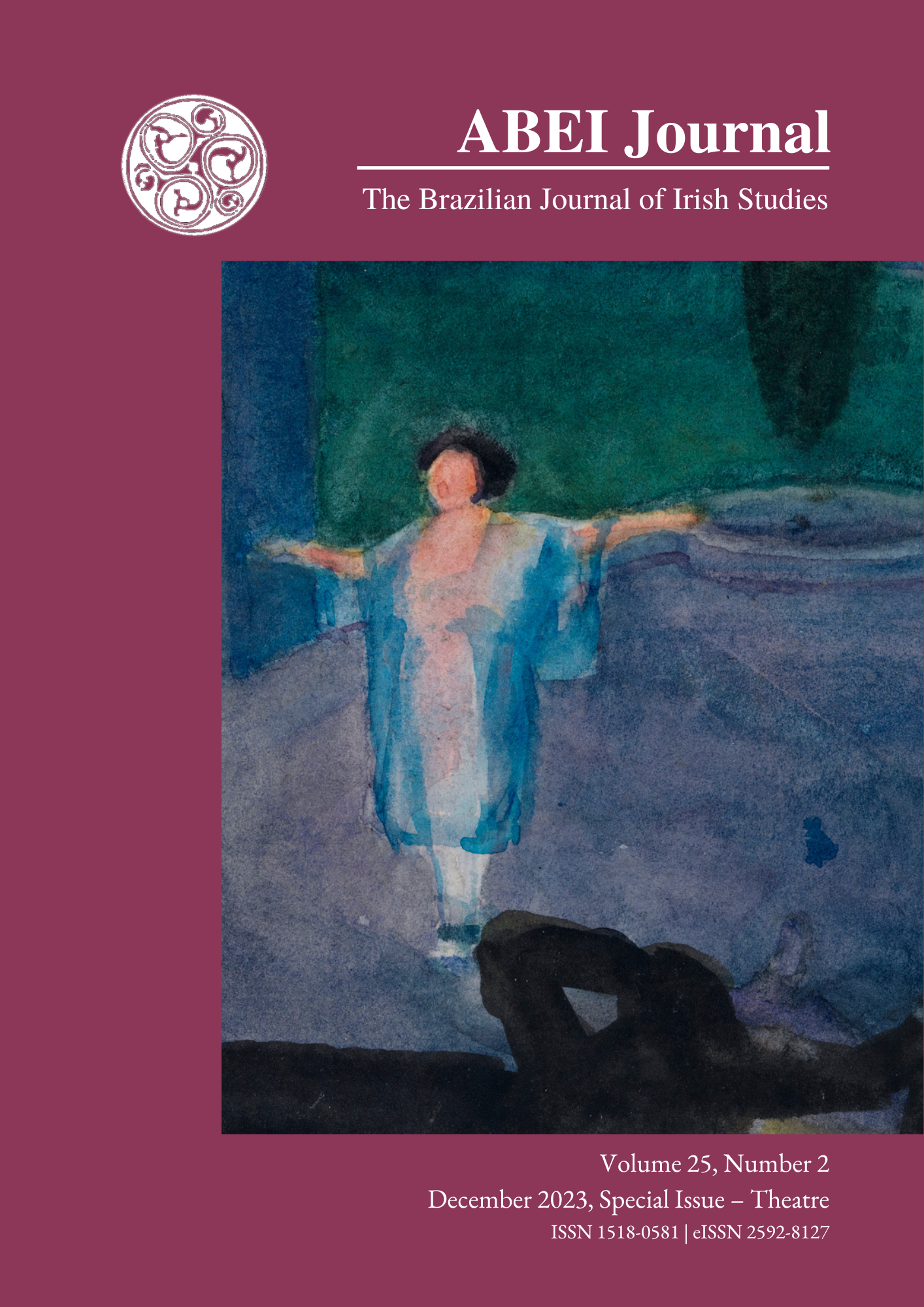Da tragédia épica para a épica trágica: Hecuba, Girl on an Altar e iGirl de Marina Carr
DOI:
https://doi.org/10.11606/issn.2595-8127.v25i2p47-62Palavras-chave:
Marina Carr, Epic tragedy, iGirl, Hecuba, Girl on an AltarResumo
Este artigo examina o gênero da “tragédia épica” em duas das mais recentes adaptações da tragédia grega por Marina Carr, Hécuba (2015) e Girl on an Altar (2022), bem como sua inversão para produzir um “épico trágico” em iGirl (2021). Na Poética, Aristóteles estabelece uma distinção clara entre os gêneros épico e tragédia. No entanto, essa distinção tem sido desafiada ao longo da história em práticas dramáticas – nas peças trágicas de Eurípides e Shakespeare, por exemplo – e teorias – principalmente pelo surgimento do teatro épico cunhado por Bertolt Brecht. Com base em todas essas tradições, este artigo destaca o processo de Carr de “epicização” da tragédia por meio da implementação de uma nova forma de discurso dramático e da dramatização de uma narrativa em vez de um enredo em Hécuba e Girl on an Altar. Essas estratégias influenciaram a criação de iGirl, que é um épico pós-moderno levado ao palco pelas lentes da tragédia.
Referências
“Playwright Marina Carr in conversation with Fiona Macintosh.” Reimagining Ancient Greece and Rome: APGRD public lectures, 9 August 2016, www.podcasts.ox.ac.uk/playwright-marina-carr-conversation-fiona-macintosh.
“That Trojan Queen. Marina Carr. TEDxDCU.” Youtube, uploaded by TEDx Talks, 18 January 2017, https://www.youtube.com/watch?v=pAKXPoJJHAs.
Aristotle. Poetics. Edited and translated by Stephen Halliwell et alii, Harvard University Press, 1999.
Brecht, Bertolt. Brecht on Theatre: The Development of an Aesthetic. Edited and translated by John Willett. Eyre Methuen, 1964.
Carr, Marina. “Hecuba.” Plays Three. Faber, 2015, pp. 205-260.
---. iGirl. Faber, 2021.
---. Girl on an Altar. Faber, 2022.
Chacón, María del Mar González. “‘This is not about love, this is about guilt and terror’: Phaedra Backwards (2011) and Forwards by Marina Carr.” Irish Studies Review, vol. 28, no. 4, 2020, pp. 481-497.
Diamond, Elin. Unmaking Mimesis: Essays on Feminism and Theatre. Routledge, 1997.
Euripides. Hecuba. Edited and translated by David Kovacs. Harvard University Press, 1995.
Gould, John. Myth, Ritual, Memory, and Exchange: Essays in Greek Literature and Culture. Oxford University Press, 2001.
Hoenselaars, Ton. “Shakespeare’s English History Plays.” The New Cambridge Companion to Shakespeare, edited by Magreta De Grazia and Stanley Wells. Cambridge University Press, 2010, pp. 137-151.
Homer. Iliad. Edited and translated by A. T. Murray and William F. Wyatt, vol. 1, Harvard University Press, 1999.
Jordan, Eamonn. “Unmasking the Myths? Marina Carr’s By the Bog of Cats… and On Raftery’s Hill.” Amid our Troubles: Irish Versions of Greek Tragedy, edited by Marianne McDonald and J. Michael Walton. Methuen, 2002, pp. 243-262.
Leavy, Adrienne. “Marina Carr interview: ‘There is an affinity between the Russian soul and the Irish soul’”. Irish Times, 6 December 2016, https://www.irishtimes.com/culture/books/marina-carr-interview-there-is-an-affinity-between-the-russian-soul-and-the-irish-soul-1.2893945. Accessed 6 May 2023.
Lonergan, Patrick. Irish Drama and Theatre Since 1950. Methuen, 2019.
Macintosh, Fiona. “‘Epic’ Performances: From Brecht to Homer and Back.” Epic Performances from the Middle Ages into the Twenty-First Century, edited by Fiona Macintosh et alii. Oxford University Press, 2018, pp. 3-15.
Macintosh, Fiona and Justine McConnell. Performing Epic or Telling Tales. Oxford University Press, 2020.
Murphy, Paula. “Staging Histories in Marina Carr’s Midlands Plays.” Irish University Review, vol. 36, No. 2, 2006, pp. 389-402.
Nietzsche, Friedrich. The Birth of Tragedy. Translated by Douglas Smith. Oxford University Press, 2000.
Rabinowitz, Nancy Sorkin. Anxiety Veiled: Euripides and the Traffic in Women. Cornell University Press, 1993.
Sihra, Melissa. Marina Carr: Pastures of the Unknown. Palgrave Macmillan, 2018.
Supple, Tim. “Theatre on an Epic Scale.” Epic Performances from the Middle Ages into the Twenty-First Century, edited by Fiona Macintosh et alii. Oxford University Press, 2018, pp. 46-59.
Torrance, Isabelle.“Trojan Women and Irish Sexual Politics, 1920-2015.” Classics and Irish Politics, 1916-2016, edited by Isabelle Torrance and Donncha O’Rourke. Oxford University Press, 2020, pp. 254–267.
Torrance, Isabelle. “Greek Tragedy and Irish Politics in the Decade of Commemorations.” Éire-Ireland, vol. 57, no. 1, 2022, pp. 189-213.
Vernant, Jean-Pierre and Pierre Vidal Naquet. Myth and Tragedy in Ancient Greece. Translated by Janet Lloyd. Zone Books, 1996.
Wallace, Clare. “Marina Carr’s Hecuba: Agency, Anger and Correcting Euripides.” Irish Studies Review, vol. 27, no. 4, 2019, pp. 512-527.
Wang, W. Michelle. “Readerly Plays: Narration and Formal Experimentation in Marina Carr’s Hecuba.” Style, vol. 54, no. 4, pp. 399-417.
Zeitlin, Froma. Playing the Other: Gender and Society in Classical Greek Literature. University of Chicago Press, 1996.
Downloads
Publicado
Edição
Seção
Licença
Copyright (c) 2023 Salomé Paul

Este trabalho está licenciado sob uma licença Creative Commons Attribution-NonCommercial 4.0 International License.


